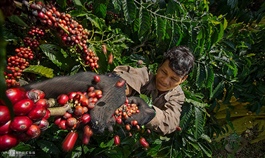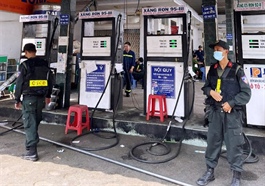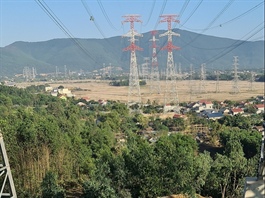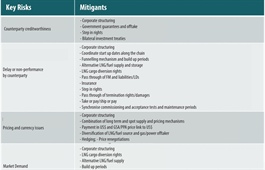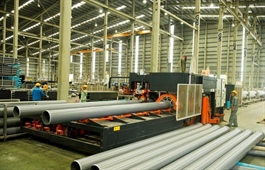Local consideration required in Vietnam’s energy advance
Local consideration required in Vietnam’s energy advance
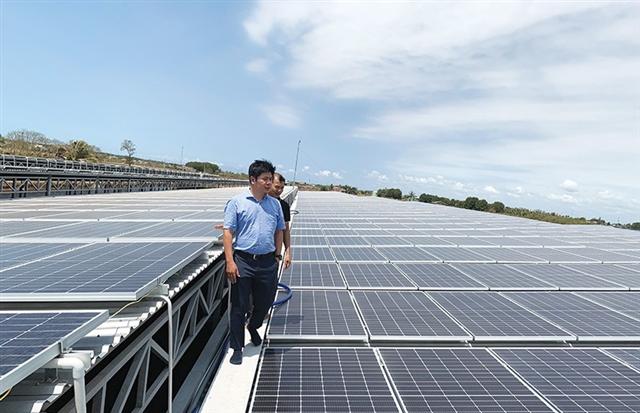
Individuals, families, and businesses are utilising huge solar panels in order to make long-term savings
|
In Vinh Hau A commune of the Mekong Delta province of Bac Lieu’s Hoa Binh district, the shrimp farm of Long Manh Co., Ltd. is one of the largest and most successful farms in the district. Covering an area of four hectares, the farm utilises solar panels on its rooftops and the shrimp ponds, which have been generating additional benefits for the company.
When Long Van Nghia, the owner of the farm, heard about renewable energy which has become popular in the province over the last few years, he installed a small solar rooftop unit with a capacity of 25kW for trial in early 2020.
“The rooftop unit helped me to save around $260 from my power bill. Instead of paying $950-1,100 every month, I have spent only $700-870 for my electricity since then,” said Nghia.
Realising this benefit, Nghia decided to expand his solar generation. “Covering an area of 2ha, the total capacity of my solar units amounts to 2MW now. Now, I don’t have to pay for my electricity at all and instead, I’m earning around $26,000 every month,” he added.
High-tech farms
Long Manh’s farm has been developed since 2016 and achieves an annual output of 75-80 tonnes of shrimp. However, of the 4ha, only around 6,000 square metres account for actual shrimp ponds, while the remainder is used for secondary ponds and other auxiliary facilities.
Since it takes a lot of power to operate a shrimp farm, with such costs amounting to around 10 per cent of the total costs, Nghia decided to upgrade the farm to a high-tech agricultural one by utilising solar power. He invested around $1.43 million to improve his farm, with almost $435,000 going solely into the 2ha of solar rooftop units.
“I’m using these huge solar panels on the ponds for water and other purposes, and in addition to the produced electricity, these units also regulate the temperature and reduce the farm’s greenhouse gas emissions,” Nghia said, explaining the benefits of his solar rooftop units and emphasising that his investment should be paid back within 5-6 years.
In other provinces of the Mekong Delta like An Giang and Hau Giang, and Can Tho city, more high-tech agricultural farms are emerging, including those for dairy, basa fish, and other plants and husbandry. By switching to reliable solar power generation, these farmers worry less about the performance of their agricultural production.
Minister of Agricultural and Rural Development Nguyen Xuan Cuong said such models are following the concept of the circular economy, without wasting any resources. As a result, regional value chains have improved significantly.
“Such projects not only generate hundreds of millions of VND for every hectare of land but also represent huge values on arid lands, which can support the combat of climate change and the sustainable development of agricultural production,” the minister said.
|
Reassigning land
However, solar power projects are not brightening every aspect of the locals’ lives and can push some into serious problems. As large solar power farms are placed across the nation, some lose all their land and thus their livelihoods.
Tran Van Tu, a resident of Phuoc The commune of the south-central province of Binh Thuan’s Tuy Phong district, and his wife felt free and happy after they received financial compensation for their land. However, the money has been burned quickly and now there is no way of recovering it.
“We received about $52,000 for our 2ha of agricultural land in 2019, where we used to raise pigs and cows. Without any land for cultivation or husbandry, we feel worried for our lives, as the rest of the compensation is nearly used up,” said Tu.
According to a report by non-profit organisation Oxfam, 16,600MW of renewable energy has already been installed across Vietnam, covering an area of nearly 17,000ha of what was previously farmland and forests.
“These figures will increase sharply to up to 36,000ha by 2030 and 206,000ha by 2050 based on the planned capacity in the third draft of the National Power Development Plan 8,” said Nguyen Ngoc Huy, senior consultant of Oxfam Vietnam.
As thousands of hectares of agricultural land have been reassigned for energy generation, huge solar panels and wind turbines cover the previous agricultural land. That means millions of residents and farmers have already or will become unemployed, without any means to generate a stable income from agricultural lands.
Even though numerous companies have been hiring local employees to work on their solar and wind farms for decent salaries of around $260-650 per month, including for works such as washing the photovoltaic plates, repairing the installations, and securing the premises, there is no official report on previous farmers’ lives and whether these have been employed.
It also remains unclear how many people are currently working in renewable energy plants, and how many of the previous farmers found new jobs or remain unemployed.
In the case of a solar farm run by Trung Nam Group in the south-central province of Ninh Thuan’s Thuan Bac district, which is located on an area of 990ha, only 45 workers have been employed to clean the panels every evening.
In addition to the precarious employment situation of expelled farmers, renewable energy projects have caused several lawsuits in the localities, mostly related to compensation, land disputes, and clearance.
For instance, although the 40.8-ha VSP Binh Thuan II solar plant by VSP Binh Thuan II Solar Power JSC has already been put into operation, numerous locals have yet to receive compensation for their land.
In early 2018, farmer Pham Van Lai and his family in Binh Thuan’s Tuy Phong district were informed of the acquisition of their land to develop the VSP Binh Thuan II project in Vinh Hao commune. After only receiving meagre compensation, Lai filed complaints to local authorities and the government’s inspection office but nothing has been done since. On January 6, Binh Thuan People’s Committee made a written request to the district-level People’s Committee to ask for resolving the lawsuit, but the man has received no feedback.
“The representative of the company came and talked with me once only to ask me to withdraw the complaints. I refused and the company continued building the solar farm on my land without my permission or compensating me,” explained Lai.
Thus, he and his family are now left without any land and any income, while still waiting for compensation.
Despite the obvious advantages that solar power projects can offer Vietnam’s development, cases like Lai’s showcase that such projects can cause lasting problems for those who are asked to leave their land.




